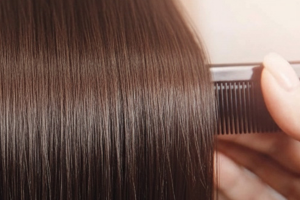
Could That Skin Trouble Be Due to an Imbalance in the Autonomic Nervous System?
Why does my skin feel rough, even though it’s getting warmer?…I want to wear spring-colored clothes, but my face looks dull and doesn’t match…
Have you ever had such experiences?
Spring is a season when skin problems tend to increase. The cause may be disturbances in the autonomic nervous system.
In this article, skincare consultant Tamayo Okubo will explains the reasons for skin troubles that are prone to occur in spring and their countermeasures.
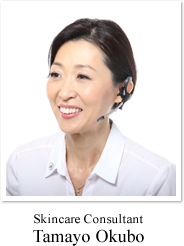

b.glen proposes skincare methods tailored to the night and daytime, focusing on the human body's cycle.
The autonomic nervous system, which controls the human body, enters a “consumption” cycle during the day, making it active while skin is exposed to various stresses.
Conversely, the body enters a “recovery” cycle at night, and the skin’s turnover, the process of regeneration, becomes more active in your sleep. Therefore, it is the optimal time for skin rejuvenation.
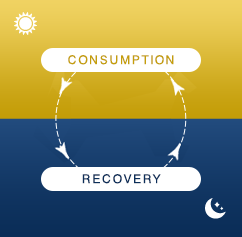
Autonomic Nervous System and Your Skin
The autonomic nervous system consists of two types of nerves with contrasting functions: the “sympathetic nervous system” and the “parasympathetic nervous system.” It controls functions such as secretion, metabolism, respiration, heartbeat, and digestion, that cannot be regulated by one’s will.
The reason the autonomic nervous system gets disturbed in spring is due to an increase in stress.
The internal stress caused by environmental changes, such as moving or advancing to a new school, along with the external stress from rapidly changing weather and temperature, as well as the increase in ultraviolet radiation, contribute to the autonomic nervous system becoming more easily disturbed.
When the autonomic nervous system is disturbed and secretion and metabolism become unstable, skin problems such as dryness, dullness, and acne are more likely to occur.
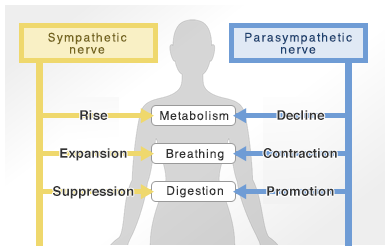
Skin Problems Caused by the Autonomic Nervous System
1: Rough and Dry Face
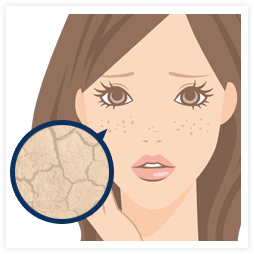
Have you suddenly realized that your face is dry and feels stiff and rough?
When the disruption of the autonomic nervous system affects the secretion functions providing moisture and flexibility to the skin, it leads to dryness and stiffness. Stress that destabilizes the autonomic nervous system, also generates reactive oxygen species that destroy collagen and elastin, the foundations of skin elasticity. This is what accelerates the formation of wrinkles and sagging.
2: Stress-Induced Dull Skin
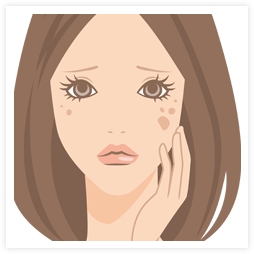
Ever noticed your complexion looks dull in the mirror for some reason?
When the autonomic nervous system is disrupted and metabolism deteriorates, the skin’s turnover cycle becomes irregular, leading to the accumulation of excess waste and melanin in the skin, resulting in a loss of transparency. Furthermore, poor circulation due to stress can cause the skin to become dull.
3: Autonomic Nervous System Acne
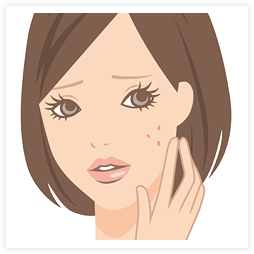
We often hear people say, ‘I suddenly started getting acne in spring.’
When sebum production becomes overly active, it can lead to acne. If you’re not usually prone to acne but have started experiencing breakouts, it may be a sign that your autonomic nervous system is disturbed.
To solve these skin concerns, it is particularly important to focus on skincare that takes the "autonomic nervous system" into account during this season.
How to Address Skin Problems Caused by the Autonomic Nerves
1: Rough and Dry Face
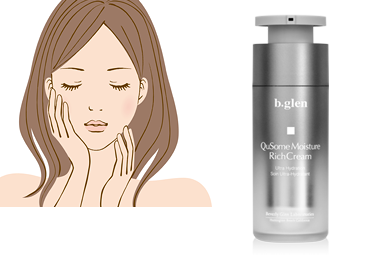
Morning Facial Yoga and Emollient Moisturizing
To loosen a stiff face, regain a soft expression with “Facial Yoga” first thing in the morning.
Afterward, thoroughly penetrate the skin with Lotion using a hand press, soften the dry skin, and then try incorporating QuSome Moisture Rich Cream. Preventing the evaporation of moisture can bring you closer to a supple and youthful-looking skin.
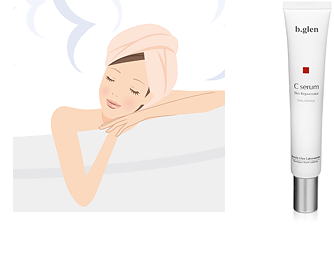
Moisturized and Relaxed Smile
Take a half-body bath at night to thoroughly relieve body fatigue in order to unwind the tension in muscles that cause stiffness.
Use a beauty serum with pure Vitamin C, like C serum, to regulate sebum secretion and maintain moisturized, elastic skin.
Also, stress can cause facial stiffness. Even making a smile during skincare can trigger a positive reaction in the brain.
2: Stress-Induced Dull Skin
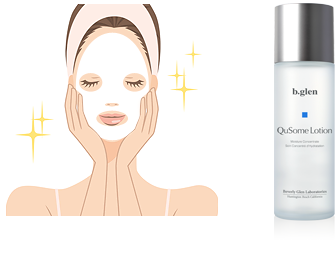
Regulate Turnover with a Lotion Pack
If your complexion looks dull or lackluster after washing your face, try an immediate effect pack with QuSome Lotion. As moisture evaporates from the skin even while you sleep at night, in the morning care, soak a sheet mask or cotton with plenty of QuSome Lotion to slowly penetrate moisture and beauty ingredients deep into the stratum corneum.
The “QuSome® Complex” provides moisture and vitality to the skin, regulates turnover, and enhances the barrier function, protecting against daytime stress.
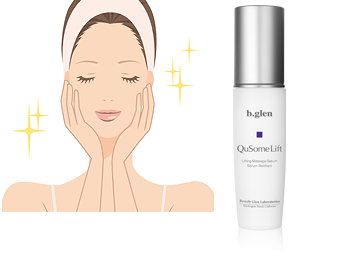
Boost Metabolism with Face Massage
The cause of dullness is not only stress. Various factors, including “dryness,” “poor circulation,” and “effects of UV rays,” can be considered, but improving circulation and boosting the skin’s metabolism can address all skin concerns.
After taking a leisurely bath, try incorporating a massage with QuSome Lift. The massage enhances skin metabolism, making it easier to eliminate waste products and melanin.
3: Autonomic Nervous System Acne
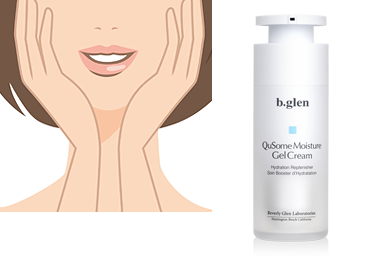
Protect the Skin from Daytime Irritants with Moisturization
When the autonomic nervous system’s tension increases, sebum secretion becomes more active than usual, disrupting the balance of body functions and creating a state prone to acne. Being exposed to the outside air dries out the skin and further increases sebum production, so moisturization is particularly important in morning care.
Use QuSome Moisture Gel Cream on top of the moisture provided by Lotion to lock in hydration and strengthen the skin’s defense.
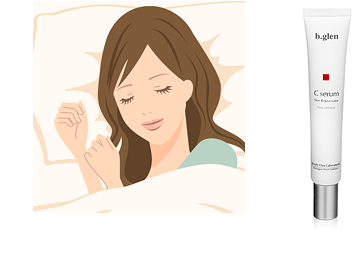
Relax and Take Care of Your Skin Early
For skin that has started to develop acne, taking thorough care of it during the night is key to calming acne the next day. To ensure smooth skin turnover in your sleep, complete your skincare routine earlier than usual and get plenty of sleep.
After thoroughly moisturizing with Lotion, apply C serum, which contains pure Vitamin C to balance sebum secretion, and blend it into your skin while taking slow, deep breaths. Aiming for a “1:2” ratio of inhalation to exhalation is crucial. By focusing on your breath, you can regulate your autonomic nervous system along with your skin.
Skin Problems Caused by the Autonomic Nervous System
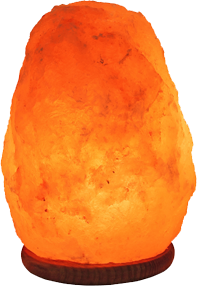
In your daily life, make sure to smoothly transition between the autonomic nervous systems in the morning and evening. At night, to enhance the activity of the parasympathetic nervous system, which relaxes the body, avoid overstimulating the brain with computers, smartphones, and TV.

To favor the parasympathetic nervous system, which soothes stress, the neurotransmitter “serotonin” becomes essential in the brain. Consuming the amino acid “tryptophan,” which is a precursor to serotonin, through your diet can lead to a deeper state of relaxation. Milk and cocoa are known to be rich in tryptophan. How about trying a cup of hot cocoa before going to bed?
Furthermore, after waking up, try to expose yourself to as much sunlight as possible to reset your internal clock.
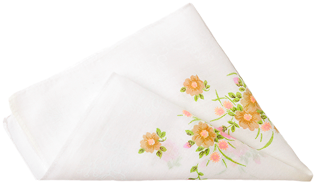
In order to relieve the stress that can disrupt the autonomic nervous system, sometimes it’s recommended to let it all out in a good cry, emptying both mind and body.
Stress as the Spice of Life
Spring marks the start of new beginnings and various changes. Viewing the stress caused by such changes as the “spice of life” and making it work in your favor is a key to stabilizing the autonomic nervous system. Seeing stress as a normal part of life, why not take the changes this spring as an opportunity to try something new, whether it’s in hobbies, learning something new, or even skincare?

